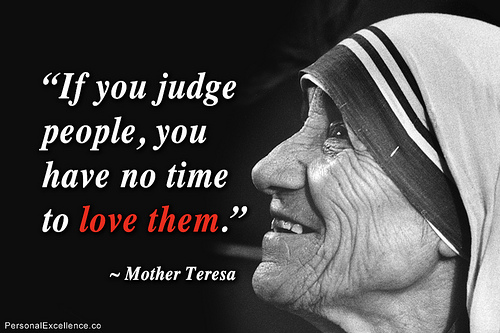We run our website the way we wished the whole internet worked: we provide high quality original content with no ads. We are funded solely by your direct support. Please consider supporting this project.
How Judging Blocks Love
What keeps us from fulfilling the law of love that is exemplified by Jesus and laid out in the Scriptures (Matt. 22:39-40; Rom 13:8,10 Gal 5:14)? In a word, we like to pass verdicts. To some extent, we get our sense of worth from attaching worth or detracting worth from others, based on what we see. We position ourselves as judges of others rather than simply as lovers of others. Our judgments are so instinctive to us that we usually do not notice them. Even worse, they are so natural to us that when we do notice them, we often assume we are righteous for passing judgment! Because of this, it is easy to overlook the fact that our judgments are blocking our love, keeping us asleep, preventing us from living in the truth God created us to live in.
Another way of saying this is that we fail to abide in love because we choose to live from our knowledge of good and evil. This is why the Bible depicts the origin of our separation from God as eating form the Tree of Knowledge of Good and Evil, which was in the middle of the garden (Gen 3:1-9).
Consider, why was the fruit of the forbidden tree a fruit that was said to give the knowledge of good as well as evil? Isn’t the “knowledge of good” a good thing? Aren’t we Christians supposed to be promoting “the knowledge of good”? Isn’t following God all about increasing our “knowledge of good and evil” so we can side with “the good” and resist “the evil”? And yet, whether it fits our preconceptions or not, in the Genesis narrative the nature of the sin that separates us from God is said to be the “knowledge of good and evil.”
What is it about eating fruit from the Tree of Knowledge of Good and Evil that warrants its depiction in Scripture as the source of original sin? How does living from our knowledge of good and evil separate us from God? These questions are rarely asked and even more rarely investigated with any thoroughness. It is largely for this reason that the church has failed so miserably at loving the way Christ commands us to love.
We have failed to understand and internalize the biblical teaching that our fundamental sin is not our evil—as though the solution for sin was to become good—but our getting life from what we believe is our knowledge of good and evil. Our fundamental sin is that we place ourselves in the position of God and divide the world between what we judge to be good and what we judge to be evil. And this judgment is the primary thing that keeps us from doing the central thing God created us to do, namely, love like he loves.
Because we do not usually understand and internalize the nature of our foundational sin, we usually think our job as Christians is to embrace a moral system, live by it, and thus to be good people in contrast to all those who are evil. In fact, God’s goal for us is much more profound and much more beautiful than merely being good: it is to do the will of God by being loving, just as God is loving. God’s goal for us is to discover a relationship with him and thereby a relationship with ourselves and others that returns us to a state where we don’t live by our knowledge of good and evil.
Walking in obedience to God, we are still to detect good and evil, of course. Living in love in no way implies moral relativism. But we are not to derive any worth from our detection of good and evil. Nor are we to draw conclusions about people on the basis of it. We are to derive worth from God alone and to love without judgment and without conditions on the basis of the unsurpassable fullness we get from God. Out job is to love, not judge.
—Adapted from Repenting of Religion, pages 16-18
Category: General
Tags: Judgment, Kingdom Living, Love, Tree of the Knowledge of Good and Evil
Topics: Following Jesus
Related Reading

Following Jesus Doesn’t Work
I met a middle aged woman one day who told me she had given up on Christianity. “It just didn’t work for me,” she said. My response was: “What on earth made you think Jesus was supposed to work for you? The truth is that you were supposed to work for him.” The sentiment is…

Lies, Truth, and the Holy Spirit
The root of the flesh is a lie about who God is and who we are. Satan brings us into bondage of the flesh by convincing us that God is not the loving God he says that he is. In doing this, Satan convinces us that we cannot find fullness of life by being wholly…

Rethinking Election: Romans 9, Part 1
Many people believe that Romans 9 demonstrates that God has the right and power to save whichever individuals he wants to save and damn whichever individuals he wants to damn. I’ll call this the “deterministic” reading of Romans 9, for it holds that God determines who will be saved and who will be lost. On…

The Danger of the Penal Substitution View of Atonement
About 25 years ago I was traveling on the freeway to somewhere or other and I stopped at a truck stop to get a bite to eat. I sat down at the counter next to this scruffy truck driver who had just started his lunch, and we started up a friendly conversation. Within about fifteen…

Does the Doctrine of the Trinity Matter?
Jesus reveals the greatest, most beautiful, and mysterious aspect of God when he, despite being himself God Incarnate, relates to God as his “Father” and refers to God as “the Holy Spirit.” There is, of course, only one God (1 Cor 8:6). Yet Jesus reveals that God somehow exists as Father, Son and Holy Spirit.…

The Challenge of Malala to the Church
http://youtu.be/f506lCk6Tos I don’t know if you’ve seen this, but it’s Malala Yousafzai appearing on Jon Stewart’s The Daily Show. At the age of 14 Malala was shot in the face at point blank range by the Taliban while riding to school on a bus, all because she wouldn’t stop speaking up for the right of…

